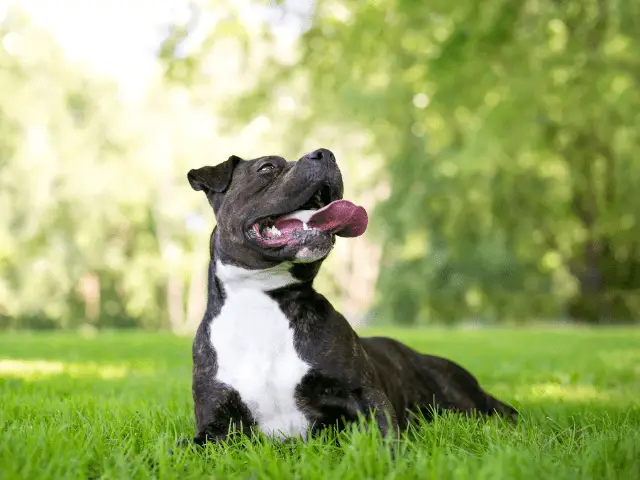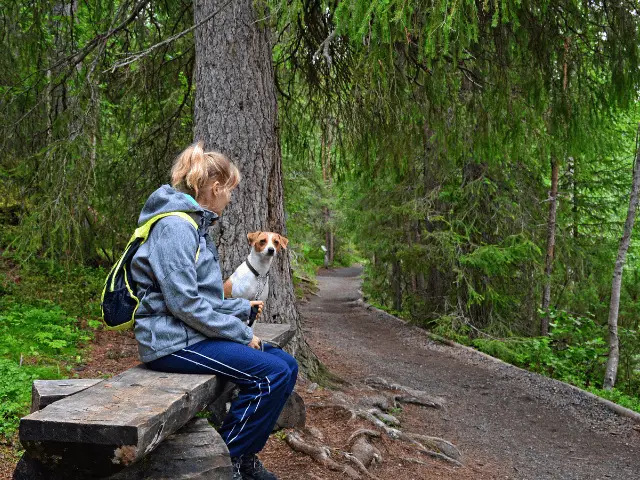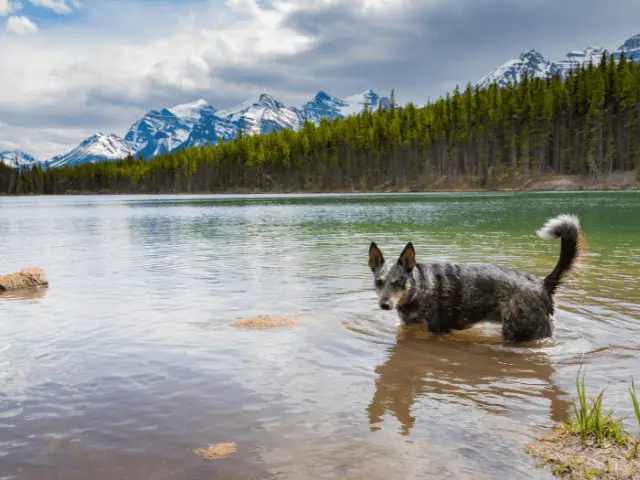Hiking with a dog can be one of the best ways to provide enrichment and exercise for canine companions as well as to foster a deeper connection between pets and their owners. Keeping pets happy and healthy during hikes requires taking special precautions and keeping a watchful eye along the trail.
In the hot summer months, owners should be especially vigilant as dogs on the trail are highly susceptible to overexertion and heat stroke.
What is Heat Stroke?
Heat stroke in dogs is a life-threatening medical emergency that occurs when an animal sustains elevated body temperatures for an extended period of time. This elevation in body temperature, known as hyperthermia , can lead to organ failure and death once the internal body temperature reaches about 107°F.
, can lead to organ failure and death once the internal body temperature reaches about 107°F.
The most common cause of heat stroke in dogs is overexertion during playtime or prolonged exposure to high temperatures without access to water, shade, or other cooling mechanisms.
Hikers bringing their dogs along on the trail should always remain vigilant when hiking on hot days and know the signs and symptoms of heat stroke to avoid a potentially life-threatening situation for their pet.
Signs and Symptoms of Heat Stroke

Hikers planning on spending the summer months on the trail with their canine companion should be able to recognize the signs and symptoms of heat stroke at the first sight to be able to intervene when needed. Being able to recognize heat stroke early allows pet parents to offer first aid to their pet which can help decrease the risk of severe complications, organ damage, and death.
Signs and Symptoms of Heat Stroke Include:
- Excessive panting or difficulty breathing
- Dry mouth or dry, sticky gums
- Bright red or purplish gums
- Elevated heart rate
- Feeling warm to the touch
- Vomiting and/or diarrhea
- Seizures
- Collapse
What to do if Your Dog is Experiencing Symptoms of Heat Stroke
Although the best way to avoid heat stroke in dogs is through taking preventive measures, pet owners noticing symptoms of heat stroke in their dog during a hike can offer some first aid on the trail to help relieve symptoms of the condition.
For owners that notice their dog displaying symptoms of overexertion, the most important first step is always to stop and rest. During the rest period, owners should move to a shaded area and offer plenty of water. Dogs should be allowed to drink until they are content, but not so much that they may gorge themselves leading to vomiting.
Pet owners with a pet first aid kit, should check their dog’s rectal temperature.
Owners with dogs displaying signs of hyperthermia should immediately stop the hike and seek emergency veterinary medical care. If able, pet parents should carry their dog off the trail as further physical exertion can worsen symptoms of heat stroke.
How to Avoid Heat Stroke in Dogs
Hikers bringing their dogs along on the trail can easily avoid heat stroke by following proper precautions including packing enough supplies and maintaining a watchful eye along the trail.
Bring Plenty of Water
One of the most important ways to prevent heat stroke in dogs is to ensure they receive enough water during hikes, especially on hot days. When preparing for a hike, owners should plan on bringing plenty of fresh drinking water and travel bowls to offer dogs water along the trail.
A good rule of thumb for owners to follow throughout the hike is to offer their dogs water each time they stop to take a drink for themselves.
Choose Trails with Shade

When hiking during hot summer months, owners should consider choosing trails with plenty of shade along the way to keep themselves and their dogs cool. In general, shaded areas are approximately 10-15 degrees cooler than areas in full sun and taking plenty of breaks during long hikes can greatly reduce the risk of heat stroke in dogs.
Try a Shorter Route
Although hiking can be a great physical activity for high-energy dogs, owners should consider shortening hikes during hot summer months to reduce the risk of overexertion and hyperthermia.
Choosing a shorter route than usual can still provide dogs with enrichment as they will be introduced to a variety of new sights, sounds, and smells along the trail that will help keep them mentally stimulated without the risk of heat stroke.
Opt for Water Activities

For dogs that enjoy water activities, swapping hiking for swimming during the summer months is a great way for dogs to get plenty of exercise while staying cool. For dogs that don’t necessarily enjoy swimming, but would enjoy relaxing in the cool water, choosing hikes with water features like shallow creeks, lakes, and ponds make an ideal spot for cooling off on a hot summer day.
Hike When the Weather is Cool
During peak summer season, dog owners should consider hiking at cooler times of the day to avoid heat exhaustion. Temperatures tend to be the coolest just before sunrise or at dusk, just after the sun has started to go down. Hikers should avoid hiking with their dogs in the midafternoon sun during hot summer months, as the hours between 1pm and 3pm tend to be the hottest time of day.
Pay Attention to Weather Advisories
Depending on what area of the country dog owners will be hiking in, temperatures during the summer months can easily reach into the mid to upper 90s or even over 100°F. Dog owners living in areas with a warm climate should always check the local weather for heat advisories before setting out on a hike and take the proper precautions as advised by the National Weather Service.
before setting out on a hike and take the proper precautions as advised by the National Weather Service.
Leave Your Dog Home!
Although hiking is a great way to keep dogs happy and healthy, skipping a day or two of hiking when the temperature is too high may be in the best interest of the dog for owners who prefer longer or more strenuous hikes. If there is any question that the weather may be too hot to bring dogs hiking, it may be best to leave Fido home.
Hiking is a great way for pet owners to keep their pets happy and healthy while building memories along the trail that will last a lifetime. Owners should take special precautions during the summer months to ensure their dog remains safe for many more years of hiking.
